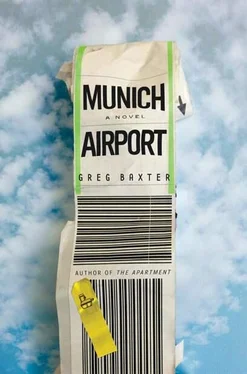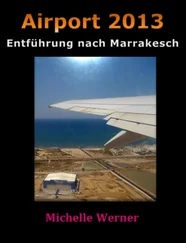Greg Baxter
Munich Airport
For James and Andreea Monnat
WE’VE BEEN SITTING for an hour or more here, up high, in the airport’s main food hall, which overlooks the duty-free, clothes, electronics, accessories, and souvenir stores below. The airy, immense space is gleaming artificially because beyond the tall glass walls, where the tarmac, runways, and mountains ought to be, there’s just fog, a soupy black fog that has covered the airport and delayed everything. The inbound jet got diverted, and will not even depart from its current location until the fog starts to burn off. Our layover in Atlanta was going to be more than six hours — we booked the flights just two days ago, so we took what we could get — but now it’s going to be tight. It’s possible we could miss it, but we haven’t yet begun to worry about that. We — my father, me, and Trish, a US consular officer who was assigned to our case, my sister’s case — have been quietly monitoring the departures board near our table.
My poor father, my poor sister. I push my seat back, stand, and excuse myself. Because of the delays, the terminal is badly overcrowded, and I have to step over lots of feet and suitcases. But everybody is calm and polite. There was madness at check-in, but here there is serenity — the anxiety just dissolves into the air and light of the terminal. I excuse myself as I walk, and the people I step over, or whose bags I step upon, beg my pardon for being in the way.
At the restroom, I have to wait in a line of men leaning against the wall of a long, plain, windowless, glossy-blue corridor. A line of women wait on the other side, too. We let people with children go ahead. They don’t ask to go ahead, we urge them ahead, we wave them forward. The line for the men’s room moves swiftly. We apologetically pass the women in their line, who do not move. I walk into an empty stall even though I do not need to use the bathroom. I just stand there and rest — and realize that I cannot rest, I don’t have the energy to rest, and the first chance I will have to rest is when I am crammed into my seat on the airplane. I think I might start to weep, but I do not weep, I just open the door, walk to the sinks, and wash my hands for a long time. Then I dry them under the hand dryer for a long time.
My father and I have been here since early morning, since darkness. We overnighted in the Airport Mercure Hotel, which is in fact five miles from the airport. We could have stayed in the city, in a nice hotel, but it seemed right to stay somewhere that made our last night in Germany feel less pleasurable and more businesslike. I was awake until three or four. I watched television until midnight, then I opened a book. I haven’t been eating, and I find it hard to get regular sleep. I took notes from the book, because it’s my habit to take notes when I read. The room was hot, and I couldn’t find the thermostat, so I opened the window. I drew back the curtains and saw fog rolling in. It came swiftly, and in patches, and it created the sensation of flying, of the hotel flying through clouds. The fog thickened in a hurry. I put my book and my notebook on the little round table by the window and leaned my arms on the windowsill, and I felt as though I was piloting the hotel. I stood there for a long time. It was freezing outside, but the air refreshed and calmed me. The hotel was a lot like an American motel — low and sprawling, with a big parking lot. Streetlamps shined copper-colored light brightly on a handful of cars. After a while I couldn’t see the cars. There was just a fast-moving fog that had copper-colored lights distantly within it. I left the windowsill. I closed the curtains but not the window — I left it slightly cracked. I took my shirt off. I took my socks off. I’d been wearing those socks forever, and taking them off made me drowsy. I fell asleep on the end of my bed, with my pants still on, legs off the bed, feet on the ground, like I’d been drinking. Around five, there was a knock on my door. It was my father. He couldn’t sleep, he said, and was thinking about heading to the airport. He was distressed. There wasn’t any point trying to convince him he needed the sleep.
The shuttle-bus driver was asleep on the couch in the hotel lobby. He was a little man in a big black jacket, a jacket with a furry hood, and I felt bad about waking him. My father and I stood over him for about a minute, watching him sleep. I could see that he was dreaming about his wife, or someone he loved, and that it was a good dream, and I could also see that he had good dreams very rarely, that normally he had nightmares, normally he could not sleep. I knew that when we woke him, he would hate us. So I did nothing, and my father did nothing, but our proximity to him must have made its way into his dream as a dark force. Perhaps suddenly his wife was drowning. He opened his eyes in a panic but did not move. There we were, standing in front of him, over him. The lobby was dark and empty, though there were a few people making noise in the restaurant, where breakfast was. The driver was small, slight, younger than me, but not by much. He was Turkish, for sure. He had black hair and dark-brown eyes, he had a very subtle mustache. We told him we needed to get to the airport. We had our bags, we had checked out of the hotel, and we were ready to go. For a little while he didn’t understand that we were reality, that his dream had ended. When he did, he sat up straight, coughed, and shook his head, and swallowed the cobwebs in his mouth. He suggested we wait. The conditions were treacherous, he said. I explained to him that it was urgent, and he didn’t argue. We walked outside into the freezing and fogged-over morning. I told him his jacket looked warm and he said it was, yes, warm. I couldn’t see the shuttle. I couldn’t see anything in the parking lot. I could barely see, behind us, the glass doors we had walked out of. The driver went ahead. We heard a door open and the engine start, then the headlights came on, as though from far away, but they were right beside us. The driver jumped out and grabbed our bags and threw them in the back. My father’s was an old, heavy, burgundy suitcase, one of a set of bespoke cases he’d received half a century ago as a wedding present. It was in pretty dire shape, but that seemed to be what he liked so much about it, and why he refused to consider, on more than one occasion over the past three weeks, my suggestion that he upgrade to something that I didn’t have to carry for him. He also had a brown leather satchel as a carry-on. My big case was black, rectangular, tall, extra-thin, and could roll on four or two wheels. I had a carry-on that was the same case in miniature. The driver closed the back door and opened the sliding door on the side. My father got in first. I helped him. He held my arm and I told him to watch his head. I got in after him and the driver closed the door behind me. The seats in the shuttle were ice-cold. The driver took a rag out of his coat pocket and wiped the fogginess from the inside of the windshield, then he blasted the defroster, which filled the shuttle with a cold breeze. My father pulled the hood of his coat over his head and stuffed his hands in his pockets. I pulled out some gloves and a hat and put them on, and I pulled the collar of my wool coat up, and held it tight around my neck. The driver obviously knew the route, and he must have sensed that there was nobody else on the roads, because he drove as he liked. We hit a few curbs and drove over an island at a roundabout. I saw the man’s eyes in the rearview mirror. He was sleepy. My father said, Sir, would you please drive a little slower? The driver said, I can see fine. My father said, But we can’t.
Читать дальше











